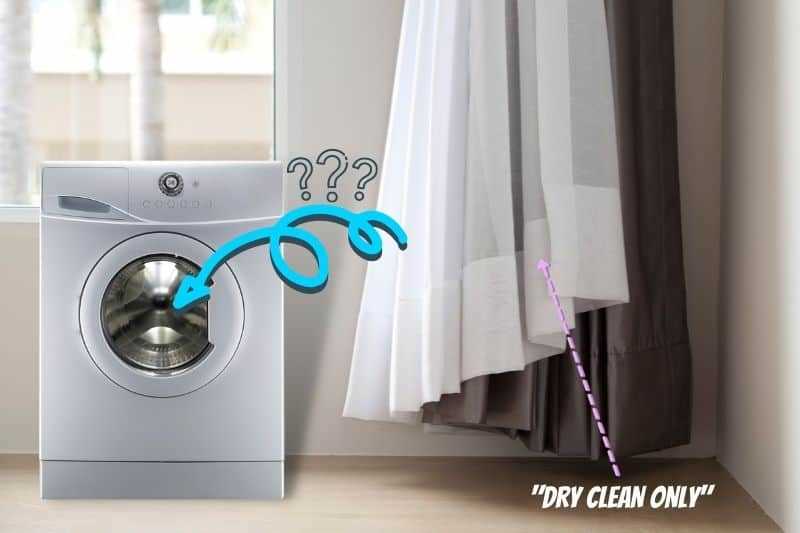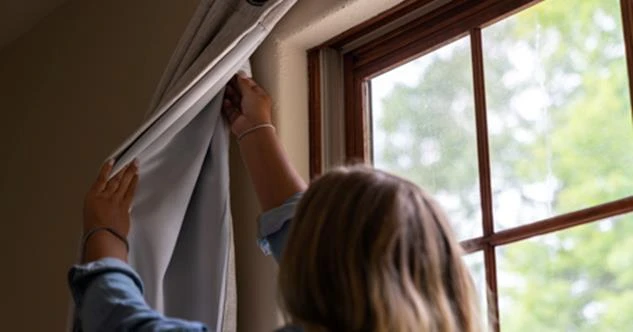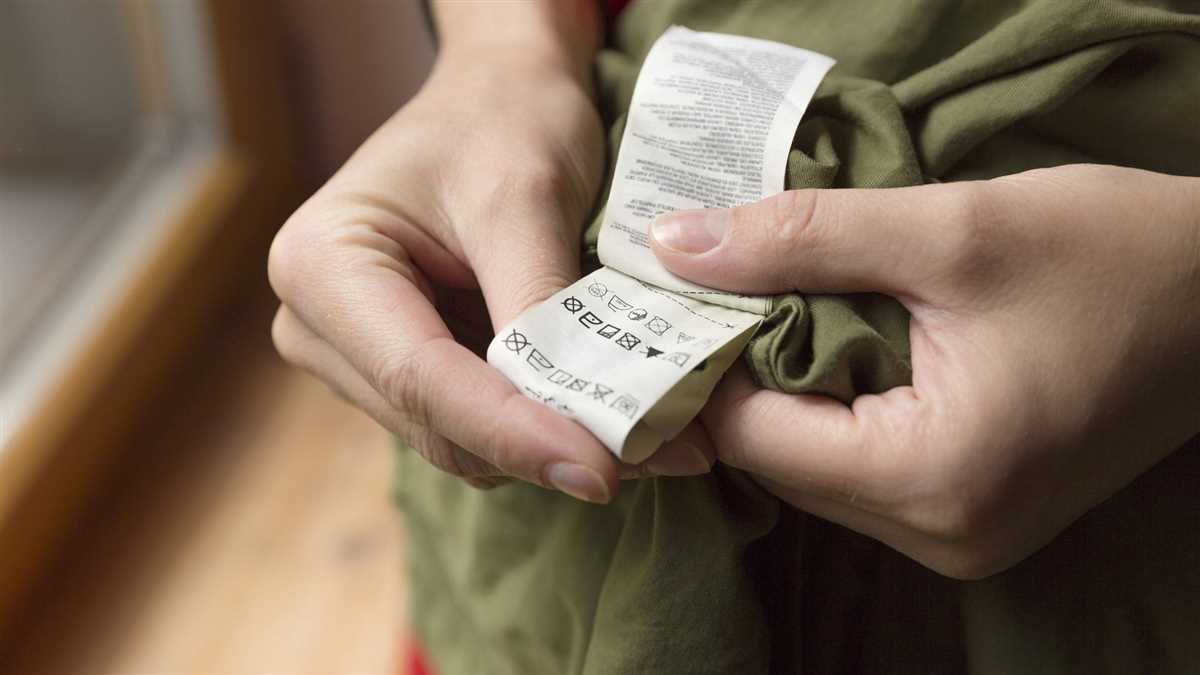




When it comes to cleaning your curtains, you may find a label that says “dry clean only.” This can be a daunting discovery, as it often implies that you cannot wash your curtains at home. However, there are situations where you may be able to wash “dry clean only” curtains with caution. In this article, we will provide expert advice on whether or not you can wash your curtains that are labeled as “dry clean only.”
First and foremost, it is important to understand why some curtains are labeled as “dry clean only.” Generally, curtains made from delicate fabrics or those with intricate designs may require special care to maintain their quality and appearance. Dry cleaning is a process that uses chemical solvents rather than water to clean fabrics, which can be gentler on delicate materials. However, this doesn’t mean that washing at home is completely out of the question.
Before attempting to wash your “dry clean only” curtains at home, it is crucial to check the manufacturer’s instructions or consult with an expert in curtain care. Some curtains may have specific cleaning requirements due to their unique construction or fabric composition. It is essential to follow these guidelines to avoid damaging your curtains or causing shrinkage or color fading.
If you decide to proceed with washing your “dry clean only” curtains at home, it is advisable to take extra precautions. Hand washing or using a gentle cycle on your washing machine can help minimize the risk of damage. Additionally, using a mild detergent and avoiding harsh chemicals or bleach is essential to preserve the fabric. After washing, it is crucial to air dry the curtains by laying them flat or hanging them to prevent any creasing or stretching.
Note: Washing curtains labeled as “dry clean only” may void any warranty or guarantee that came with the product. It is important to weigh the risks and benefits before deciding to wash them at home. If in doubt, seeking professional advice or taking the curtains to a reputable dry cleaner may be the best course of action.
Can You Clean Curtains Marked “Dry Clean Only”? Tips From Experts
If your curtains are marked as “dry clean only,” you may be wondering if there are any alternative options for cleaning them. While it’s always best to follow the manufacturer’s instructions, there are a few methods you can try at home to freshen up your curtains.
1. Spot Clean
If you notice a small stain or spill on your curtains, you can try spot cleaning them. Use a mild detergent mixed with water and a soft cloth or sponge to gently dab at the stain. Be careful not to rub too hard, as this could damage the fabric. After spot cleaning, allow the area to air dry completely.
2. Hand Wash
If you’re feeling brave, you can hand wash your curtains. Fill a basin or bathtub with cold water and a mild detergent specifically designed for delicate fabrics. Immerse the curtains in the water and gently agitate them to loosen dirt and grime. Rinse thoroughly with cold water and gently squeeze out the excess moisture. Hang the curtains to dry, preferably outdoors or in a well-ventilated area.
3. Steam Cleaning

If you own a steamer, you can use it to freshen up your curtains. Hang the curtains and run the steamer nozzle along the fabric, holding it a few inches away. This will help remove wrinkles and freshen up the fabric. Be sure to follow the manufacturer’s instructions for your specific steamer model.
4. Professional Dry Cleaning

If you’re not comfortable with any of the above methods or if your curtains have heavy stains or delicate fabric, it’s best to take them to a professional dry cleaner. They have the expertise and equipment to handle delicate fabrics and ensure that your curtains are safely cleaned.
Note: Always check the care label and instructions provided by the manufacturer before attempting to clean your curtains. This will help to avoid any potential damage to the fabric.
In conclusion, while it’s generally recommended to follow the “dry clean only” instructions on your curtains, there are alternative methods you can try at home. Spot cleaning, hand washing, and steam cleaning are all options worth considering. If you’re unsure or if your curtains have special requirements, it’s best to seek professional dry cleaning services.
Understanding “Dry Clean Only” Labels: What They Mean and Why They’re Used
When shopping for curtains or other clothing items, you may have come across the “dry clean only” label. This label indicates that the item should be cleaned by a professional dry cleaner, rather than being washed at home. But what exactly does this label mean and why is it used?
What Does “Dry Clean Only” Mean?

The “dry clean only” label means that the item should not be washed with water, but rather cleaned using chemical solvents. Dry cleaning is a process in which garments are cleaned without being immersed in water. Instead, they are treated with a solvent, typically perchloroethylene (also known as perc), which effectively removes dirt and stains.
Why Do Some Items Have “Dry Clean Only” Labels?
There are several reasons why certain items have “dry clean only” labels:
- Fabric Sensitivity: Some fabrics, such as silk, velvet, or wool, may be too delicate or sensitive to water and can be damaged if washed in a traditional washing machine.
- Stain Removal: Dry cleaning solvents are specifically designed to remove stubborn stains, such as grease or oil, which may not come out easily with water-based washing methods.
- Shape and Structure: Certain items, like tailored clothing or heavily embellished garments, may have intricate details or construction that could be altered or damaged if exposed to water.
- Colourfastness: Some dyes used in fabrics may bleed or fade when exposed to water, resulting in the loss of colour or uneven colour distribution.
Alternative Cleaning Methods

In some cases, you may be able to safely clean “dry clean only” items at home using alternative methods:
- Spot Cleaning: If your item has a small stain or dirt spot, you can try using a gentle detergent or stain remover to treat the affected area. Be sure to test the product on a small, inconspicuous area first to avoid any potential damage.
- Steam Cleaning: Steam cleaning can be a safe and effective way to freshen up certain fabrics. However, it’s important to check the manufacturer’s instructions and test a small area before proceeding.
When in Doubt, Consult a Professional

If you’re unsure about how to clean a “dry clean only” item or have concerns about potential damage, it’s best to consult a professional dry cleaner. They have the knowledge, experience, and equipment necessary to properly clean and care for delicate and sensitive fabrics.
Remember, following the care instructions on the label can help prolong the lifespan and appearance of your curtains and clothing items. If in doubt, it’s always better to err on the side of caution and seek professional advice.
Factors to Consider Before Washing “Dry Clean Only” Curtains

While it may be tempting to wash your “dry clean only” curtains at home to save time and money, it is important to consider several factors before proceeding. Failure to properly clean these curtains can result in damage or shrinkage, so it is crucial to take the following into consideration:
1. Fabric Material
The type of fabric used for your curtains plays a significant role in determining whether or not they can be safely washed at home. Some fabrics, like silk or velvet, are more delicate and require professional dry cleaning. Check the care label or consult with the manufacturer to determine the recommended cleaning method for your specific curtains.
2. Construction and Embellishments
The construction of the curtains, including any intricate details or embellishments, should be taken into account. Beaded trims, sequins, or delicate embroidery may not withstand the agitation of a washing machine or the chemicals used in home cleaning. In such cases, professional dry cleaning is recommended to preserve the quality and appearance of the curtains.
3. Size and Washing Equipment

Consider the size of your curtains and whether or not your washing equipment can accommodate them. Larger curtains may be difficult to fit into a home washing machine, and attempting to cram them in could lead to damage and uneven cleaning. If you do attempt to wash them at home, ensure you have a suitable washing machine or alternative method, such as handwashing or using a bathtub.
4. Stains and Odours

If your curtains have specific stains or odours that need to be addressed, it is important to assess whether or not washing at home will effectively remove them. Some stains or odours may require professional treatment that cannot be replicated through home washing methods. Spot cleaning or airing out may be sufficient in some cases but seek advice if in doubt.
5. Time and Effort
Washing “dry clean only” curtains at home requires time and effort. Consider whether you are willing to invest the necessary time and energy to properly clean and care for your curtains. Keep in mind that professional dry cleaning services have the expertise and equipment to ensure a thorough and safe cleaning process.
Overall, it is essential to carefully assess the fabric, construction, size, stains, and your own willingness to invest time and effort before attempting to wash “dry clean only” curtains at home. It may be more prudent to seek professional dry cleaning services to avoid potential damage to your curtains.
Methods for Safely Washing “Dry Clean Only” Curtains
1. Spot Cleaning:
If your “dry clean only” curtains have a small stain or spot, you can try spot cleaning them instead of washing the entire curtain. Use a mild detergent or fabric cleaner and a clean cloth to gently blot the stained area. Avoid rubbing the fabric too harshly, as it can cause damage.
2. Hand Washing:
If your curtains are made of a delicate fabric or have intricate details, hand washing may be the best option. Fill a clean bathtub or large basin with warm water and a small amount of mild detergent. Immerse the curtains in the water and gently agitate them to loosen any dirt. Rinse thoroughly with clean water and gently squeeze out excess water. Hang the curtains to dry, preferably outdoors or in a well-ventilated area.
3. Machine Washing:
Before attempting to machine wash your “dry clean only” curtains, check the care label for any specific instructions or warnings. If the care label allows machine washing, use a gentle cycle and cold water. Place the curtains in a laundry bag or pillowcase to protect them from getting tangled or snagged. Add a mild detergent to the machine and wash the curtains on a delicate setting. After washing, hang the curtains to air dry or use a cool iron to remove any wrinkles.
4. Professional Wet Cleaning:
If you are unsure about washing your “dry clean only” curtains yourself or if the curtains have heavy stains or are made of a fragile fabric, it is best to take them to a professional cleaner who specializes in wet cleaning. Wet cleaning is a gentle and environmentally friendly alternative to dry cleaning, and it can effectively clean most delicate fabrics without causing damage.
5. Steam Cleaning:
Another option for cleaning “dry clean only” curtains is steam cleaning. Use a handheld steamer or a steam cleaner with a fabric attachment to gently steam the curtains. Keep the steamer a few inches away from the fabric to prevent the heat and moisture from causing any damage. Be sure to follow the manufacturer’s instructions for your specific steamer to ensure you are using it correctly.
Remember to always test a small, inconspicuous area of the curtains before cleaning them to make sure the cleaning method does not cause any damage or color fading. If you are unsure or have any concerns, it is best to consult a professional cleaner or contact the manufacturer for specific care instructions.
Professional Dry Cleaning vs. DIY: Pros and Cons

Professional Dry Cleaning
- Experts: When you opt for professional dry cleaning, you are entrusting your curtains to experts who have the knowledge and experience in dealing with delicate fabrics.
- Specialized Equipment: Professional dry cleaners have access to specialized equipment and cleaning agents that may not be available for DIY use. This ensures a thorough and effective cleaning process.
- Prolongs Curtain Lifespan: By following the care instructions and guidelines provided by professional dry cleaners, you can help prolong the lifespan of your curtains and keep them looking their best.
- Stain Removal: Professional dry cleaners have the expertise to effectively remove tough stains from your curtains, ensuring they are clean and fresh.
- Convenience: Taking your curtains to a professional dry cleaner can save you time and effort, as they will handle the cleaning process from start to finish.
DIY Dry Cleaning
- Cost Savings: DIY dry cleaning eliminates the cost of professional services, making it a more budget-friendly option.
- Convenience: With DIY dry cleaning, you have the convenience of cleaning your curtains at your own pace and within the comfort of your own home.
- Control: By handling the cleaning process yourself, you have more control over how your curtains are treated, especially if they have intricate detailing or delicate trims.
- Regular Maintenance: DIY dry cleaning allows you to perform regular maintenance on your curtains, keeping them clean and fresh in between professional cleanings.
- Risk of Damage: DIY dry cleaning carries the risk of damaging your curtains if not done properly. Certain fabrics may not withstand the cleaning agents or the washing process, leading to shrinkage or discoloration.
Ultimately, the decision between professional dry cleaning and DIY dry cleaning depends on your personal preferences, budget, and the specific requirements of your curtains. If you are unsure, it is best to consult with a professional dry cleaner who can provide expert advice tailored to your curtains.
Tips to Maintain the Quality of “Dry Clean Only” Curtains

Keeping your “dry clean only” curtains in top condition doesn’t have to be a hassle. By following a few simple tips and guidelines, you can maintain the quality of your curtains and keep them looking fresh and new. Here are some tips to help you get started:
- Read the Care Instructions: Before you attempt any cleaning method, make sure to read the care instructions provided by the manufacturer. These instructions will give you specific guidance on how to best care for your curtains.
- Spot Cleaning: If you notice any stains or spills on your curtains, it’s important to address them immediately. Use a damp cloth and a mild detergent to gently dab the affected area. Avoid rubbing the fabric vigorously, as this can damage the fibers.
- Regular Dusting: To prevent dust and dirt from accumulating on your curtains, it’s important to dust them regularly. Use a feather duster or a soft brush to gently remove any surface dust. This will help maintain the cleanliness and freshness of your curtains.
- Avoid Sun Exposure: Prolonged exposure to direct sunlight can cause the colors of your curtains to fade. To maintain their vibrancy, it’s best to keep your curtains away from direct sunlight. Use curtains liners or blinds to block out the sun if necessary.
- Proper Storage: If you need to store your curtains for an extended period of time, make sure to fold them properly and place them in a breathable storage bag or box. Avoid storing them in plastic bags, as this can trap moisture and lead to mildew or mold growth.
- Professional Dry Cleaning: If your curtains are heavily soiled or stained and you’re unsure how to clean them safely, it’s best to seek professional dry cleaning services. A professional cleaner will have the expertise and equipment to clean your curtains effectively without causing any damage.
By following these tips, you can maintain the quality and appearance of your “dry clean only” curtains for years to come. Remember to always refer to the care instructions provided by the manufacturer for the best results.
FAQ
Can I wash my curtains at home if they are labeled “dry clean only”?
It is not recommended to wash curtains labeled “dry clean only” at home. Dry cleaning is the best method for these types of curtains to ensure they are not damaged.
What happens if I wash my “dry clean only” curtains at home?
If you wash your “dry clean only” curtains at home, they may shrink, lose their shape, or become damaged. It is best to follow the care instructions provided to maintain the quality of your curtains.
Is there any way to clean “dry clean only” curtains without taking them to the dry cleaner?
While it is not recommended, some “dry clean only” curtains may be hand-washed using gentle detergent and cold water. However, it is important to test a small, inconspicuous area of the curtain first to ensure there is no damage or color bleeding.
Can I use a fabric freshener or spray on my “dry clean only” curtains to keep them fresh?
Using a fabric freshener or spray on “dry clean only” curtains is generally safe and can help keep them smelling fresh. However, it is important to read the label and check for any specific instructions or warnings from the curtain manufacturer.
How often should I take my “dry clean only” curtains to the dry cleaner?
The frequency of dry cleaning “dry clean only” curtains depends on factors such as the curtain material, location, and level of dirt or stains. It is generally recommended to have them professionally cleaned once a year or whenever they appear noticeably dirty.
Can I wash my “dry clean only” curtains at home?
While it is generally recommended to follow the “dry clean only” instructions on curtain labels, there are certain types of curtains that can be safely washed at home. It’s important to check the fabric content and care instructions before proceeding. Some curtains may have a synthetic blend that can withstand regular washing. However, for delicate or heavily embellished curtains, it is best to take them to a professional dry cleaner.
What are the risks of washing “dry clean only” curtains at home?
Washing “dry clean only” curtains at home carries certain risks. The curtains may shrink, lose their shape, or the colors may bleed. Additionally, delicate fabrics can easily be damaged during the washing process. It is always best to err on the side of caution and follow the care instructions provided by the manufacturer to ensure the longevity and appearance of your curtains.












